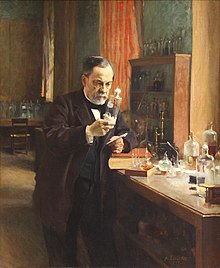

The discovery of the connection of microorganisms to disease can be dated back to the nineteenth century, when German physician Robert Koch introduced the science of microorganisms to the medical field. He identified bacteria as the cause of infectious diseases and process of fermentation in diseases. French scientist Louis Pasteur developed techniques to produce vaccines. Both Koch and Pasteur played a role in improving antisepsis in medical treatment. This had an enormous positive effect on public health and gave a better understanding of the body and diseases. In 1870-1885 the modern methods of bacteriology technique were introduced by the use of stains and by the method of separating mixtures of organisms on plates of nutrient media. Between 1880 and 1881 Pasteur produced two successful vaccinations for animals against diseases caused by bacteria and it was successful. The importance of bacteria was recognized as it led to a study of disease prevention and treatment of diseases by vaccines. Bacteriology has developed and can be studied in agriculture, marine biology, water pollution, bacterial genetics and biotechnology

0 Comments